The Parrot as a Pet: Comprehensive Guide
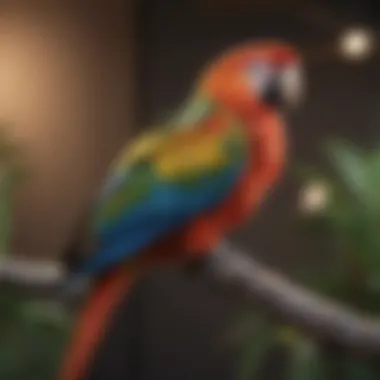
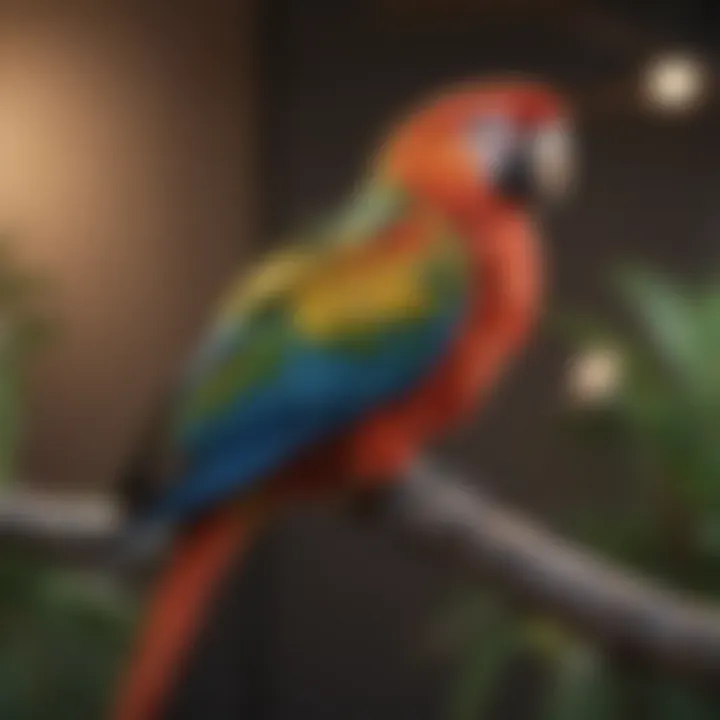
Intro
Parrots have captured the interest of many as fascinating companions. Their vibrant colors, intelligence, and ability to mimic human speech make them appealing. However, owning a parrot is not only about having a beautiful bird in the home. It involves understanding their complex needs, behaviors, and the commitment for years to come. This guide will navigate through the essential aspects of parrot ownership, offering a detailed perspective on care, training, health, and activities.
Understanding Your Pet
Pet Behavior Basics
Understanding parrot behavior is crucial for a harmonious relationship. Parrots are social creatures. They thrive on interaction with humans and other birds. Their communication is often loud and requires time to adjust. Expect vocalizations varying from soft whistles to loud squawks.
Common Breed Characteristics
Different parrot breeds exhibit distinct traits. For example, the African Grey is known for its intelligence. Cockatiels are generally gentle, making them suitable for families. While larger parrots like the Macaw might require more space and attention. Knowing breed-specific characteristics helps in choosing a parrot that fits your lifestyle.
Species-Specific Needs
Each parrot species has unique requirements. Some need more mental stimulation, while others thrive on physical activities. Just like humans, they can have preferences on their diet and environment. Understanding these needs ensures they remain happy and healthy in their new home.
Pet Care and Maintenance
Feeding Guidelines
Feeding a parrot involves more than seed mixtures. A balanced diet should include pellets, fresh fruits, and vegetables. Seeds can be a treat but should not be the majority of their food intake. Adjustments in diet may be necessary as the parrot ages or based on its health needs.
Grooming Essentials
Regular grooming is necessary. Parrots require nail trimming, beak care, and feather maintenance. Bathing can also minimize dust, keeping them clean and comfortable.
Hygiene Practices
A clean habitat is essential for a healthy parrot. Regular cage cleaning and disinfecting will prevent the buildup of harmful bacteria. Fresh water should always be available, and uneaten food should be removed daily.
Training and Development
Basic Commands and Skills
Initiating commands can strengthen the bond between parrot and owner. Commands like "step up" or "come" can be taught using positive reinforcement techniques.
Behavioral Training Techniques
Parrots can develop habits that may become problematic. Training sessions should be consistent and short. Rewarding good behavior with treats can encourage learning.
Addressing Common Behavior Issues
Understanding common behavior issues, such as biting or screaming, can help in managing them. Early interventions through proper training can prevent these behaviors from becoming entrenched.
Health and Wellness
Routine Vet Check-ups
Regular visits to an avian veterinarian are critical. They can catch health issues early and suggest appropriate vaccinations.
Vaccination Needs
Vaccinations can vary depending on the species. Discuss with a vet the necessary vaccines to keep your parrot safe from various diseases.
Recognizing Signs of Illness
Observing changes in behavior or appearance is key in recognizing health problems. Symptoms may include fluffed feathers, changes in appetite, or unusual vocalizations. Immediate vet attention can often mitigate serious health issues.
Enrichment and Activities
Indoor vs. Outdoor Activities
Parrots enjoy a variety of environments. Indoor activities may include climbing structures and foraging options. Outdoor time can stimulate their senses but should always be supervised.
Interactive Toys and Games
Toys are vital for mental stimulation. Rotate toys to maintain interest. Options include puzzles, swings, and shreddable materials to keep them engaged.
Socialization Opportunities
Encouraging social interactions can prevent loneliness. Regular family interactions or introductions to other birds can create a well-rounded social environment for the parrot.
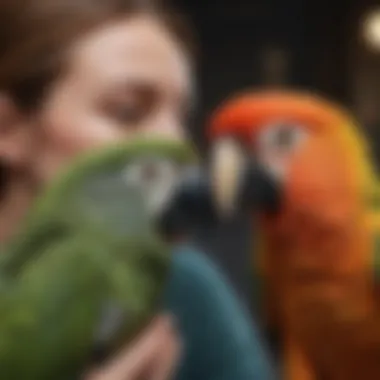

"Understanding and meeting a parrot’s needs requires dedication but brings rewarding companionship."
In summary, this guide aims to provide key insights for both new and seasoned parrot owners. It is not just about the joy of ownership, but understanding the responsibilities involved. By comprehensive knowledge, one can ensure a fulfilling relationship with these remarkable birds.
Understanding Parrots
Understanding parrots is essential for anyone considering them as a pet. These birds are not just colorful and beautiful; they are also full of personality and intelligence. By grasping their nature, potential owners can create a harmonious relationship that benefits both the parrot and the owner. Parrots have specific social, physical, and psychological needs that differ from traditional pets such as dogs and cats. A deeper understanding of these aspects can lead to better care and a fulfilling companionship.
Overview of Parrots
Parrots belong to the family Psittacidae, encompassing around 393 species. These birds are often recognized for their vibrant feathers, strong beaks, and remarkable vocal skills. Parrots are characterized as highly social creatures. They have complex communication skills and various behaviors. Their relationships within flocks show their need for social interaction. This inherent need for companionship makes them unique among pets. Understanding their natural behaviors is key to meeting their needs effectively.
Parrots in the Wild
In their natural habitats, parrots are found predominantly in tropical and subtropical regions. They can be observed in forests, woodlands, and savannas. Wild parrots often live in large social groups. Their diets typically consist of seeds, nuts, fruits, and flowers. Each species plays a specific role in its ecosystem, contributing to seed dispersal and maintaining the health of their environment. Awareness of their wild behavior provides insights into how they should be cared for in captivity. Parrots thrive in environments that simulate their natural conditions as closely as possible.
Common Species of Pet Parrots
Many species of parrots are popular as pets, each having its unique features, care requirements, and behaviors. Here are some commonly kept species:
Cockatiels
Cockatiels are small, friendly birds known for their affectionate nature. They are particularly popular among beginners due to their manageable size and relatively easy care. One strong characteristic of cockatiels is their ability to mimic sounds, including human speech or whistles. Their social nature leads to strong bonds with their owners. However, they do require daily interaction to remain happy, which can be demanding.
Budgerigars
Budgerigars, or budgies, are another popular choice for pet owners. They are small, colorful birds that are easy to care for and come in various color mutations. They possess a curious and lively personality, enhancing their appeal as pets. Budgerigars are known for their capacity to learn words and simple phrases. However, they can be prone to loneliness if not provided with adequate social stimulation. Thus, having multiple budgies can be beneficial.
African Grey Parrots
African Grey Parrots are often considered one of the most intelligent bird species. Their ability to mimic human speech and other sounds is impressive. This intelligence demands educational interaction from their owners. African Greys require mental stimulation through puzzles and problem-solving activities. While they make excellent companions, they also require more time and effort compared to smaller species. Their long lifespan means a long-term commitment is necessary.
Macaws
Macaws are large, striking birds known for their brilliant colors and sociable behaviors. They are often considered amazing companions due to their playful nature. Their strong personalities make them a delight, but they also require a spacious environment and more attention. Macaws can generate a lot of noise, making them less suitable for those living in close quarters. Proper care for macaws includes a commitment to their needs for physical and mental engagement. They thrive when their owners invest time in entertaining and engaging activities.
Benefits of Owning a Parrot
Owning a parrot can be a highly rewarding experience. Parrots are not just colorful birds; they are intelligent, social creatures that can form deep bonds with their human companions. This section will explore the core benefits of having a parrot as a pet. Understanding these benefits is essential to foster a positive relationship between the parrot and its owner.
Companionship and Bonding
Parrots are known for their sociable nature. They thrive on interaction, making them excellent companions. When they bond with their owners, they exhibit affectionate behaviors, such as preening and nuzzling. This bond can be incredibly satisfying for pet owners, leading to feelings of joy and fulfillment. Serious owners should dedicate time daily to interact and build a relationship with their parrot. Birds that receive ample attention tend to be happier and healthier.
Intelligence and Interaction
Parrots are among the most intelligent bird species. They possess the ability to learn various tricks and commands. This intelligence makes them engaging pets that can prevent boredom for their owners. Teaching a parrot to speak or perform tricks requires patience but results in a rewarding interaction. Engaging their minds through interactive activities, like puzzle toys or training sessions, can also help them develop skills.
- Common commands include:
- "Step up"
- "Come here"
Aside from verbal skills, their natural curiosity leads them to explore their environment. Owners can encourage this inquisitiveness by providing a stimulating habitat.
Physical and Mental Engagement
Owning a parrot requires providing both physical and mental stimulation. Parrots need regular opportunities to exercise. Out-of-cage playtime is crucial to ensure they remain active. Toys such as swings, ladders, and ropes can also foster physical activity. Furthermore, mental engagement is equally vital. Parrots enjoy playing with toys that require manipulation or problem-solving.
Providing a variety of toys can keep parrots entertained and reduce destructive behaviors.
Pet owners can create a rich environment that prevents boredom and encourages positive behavior. Overall, the benefits of owning a parrot are numerous. Parrots offer companionship, intellectual stimulation, and the necessity of care that leads to a fulfilling pet ownership experience.
Parrot Care Essentials
Parrots are vibrant, intelligent creatures that require proper care to ensure a long, healthy life. Understanding Parrot Care Essentials is crucial for anyone considering these pets. This section highlights key elements in managing their well-being, focusing on housing, diet, and health. Each aspect plays a significant role in maintaining a happy and thriving parrot.
Proper Housing and Environment
A suitable environment is vital for a parrot's happiness and health. The cage must be spacious enough, allowing the bird to move freely, stretch its wings, and play. Ideally, the cage should be at least two times the wingspan of the parrot. This feature encourages exercise, reducing stress and behavior issues.
The location of the cage is also essential. Placing it in a busy area of the house allows the parrot to engage with family members. This interaction fosters bonding and socialization. Ensure the area is safe, avoiding direct sunlight or drafts that may affect the bird’s comfort.
Additional items to consider include toys, perches, and climbing structures. Toys particularly contribute to mental stimulation, enabling the parrot to utilize its natural problem-solving skills. Perches should be of varying diameters to promote foot health, helping the parrot maintain strong feet.
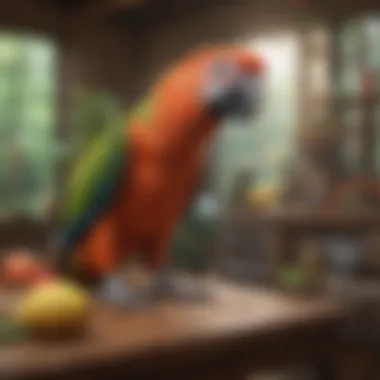
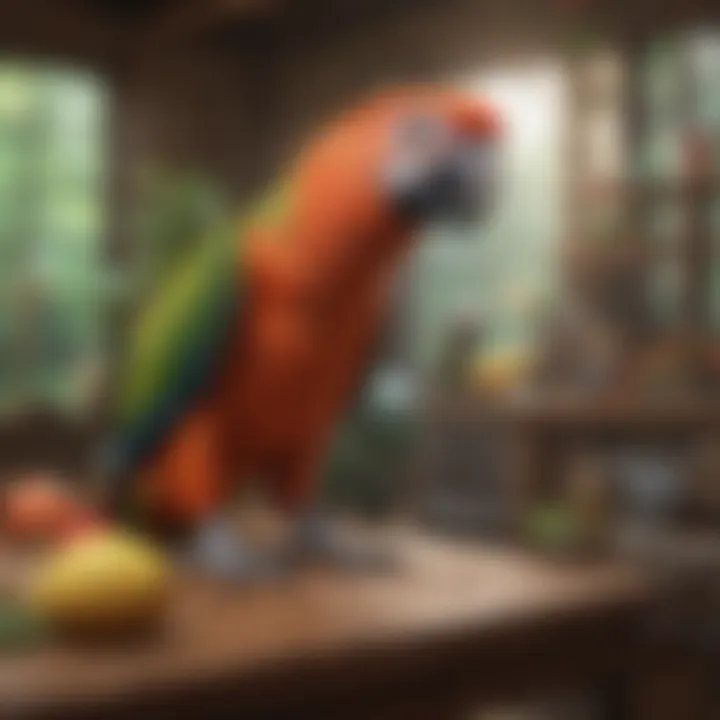
Dietary Needs of Parrots
Dietary needs are fundamental to parrot care. Providing a balanced diet contributes to overall health. Owners must consider three main components: seeds and pellets, fresh fruits and vegetables, and avoiding harmful foods. Each aspect plays a distinct role in a parrot's nutrition.
Seeds and Pellets
Seeds and pellets should form the base of a parrot's diet. Pellets, in particular, are designed to provide essential nutrients, making them a preferred option. Unlike seeds, they reduce the risk of obesity, as seeds often contain high-fat content. The key characteristic of pellets is that they offer a well-rounded blend of vitamins and minerals, ideal for a parrot's needs.
However, they can be less appealing to some birds initially. Gradually introducing pellets while reducing seed intake can ease this transition. Owners should also ensure that the chosen pellets are free from artificial colors and preservatives for the best health benefits.
Fresh Fruits and Vegetables
Fresh fruits and vegetables are essential for diversity in a parrot's diet. They provide key nutrients and hydration, as many parrots can become dehydrated with a poor diet. Items like carrots, broccoli, apples, and berries are popular choices and present a range of flavors and textures. The unique benefit of fresh produce is its role in promoting overall health through antioxidants and vitamins.
The challenge arises with knowledge of which fruits and vegetables are safe, as some can be harmful. Always research before introducing new items to a parrot's diet. A varied selection encourages exploration and keeps the parrot engaged.
Avoiding Harmful Foods
Understanding Avoiding Harmful Foods is critical for protecting your parrot from potential dangers. Certain foods can be toxic to parrots. Common items to avoid include chocolate, caffeine, onions, and avocado, which can cause various health issues. The unique feature of avoiding harmful foods is the necessity of awareness in daily feeding routines.
Educating oneself about safe food choices is a beneficial practice. Keeping a list of safe and unsafe items handy can assist in making informed decisions. Parrot safety should always remain a top priority, as neglecting diet can lead to severe health consequences.
Routine Health Checks
Regular health checks are an often-overlooked aspect of parrot care. These checks should involve observing the parrot's behavior, feather quality, and eating habits. Changes in these areas may signal underlying health issues that require attention.
Owners should familiarize themselves with the signs of common health problems. If any irregularities occur, prompt action can prevent further complications. Regular visits to an avian veterinarian are also recommended to ensure the parrot remains in optimal condition. Keeping records of health and behavior can help maintain a clear understanding of the parrot's overall wellness.
Training Your Parrot
Training a parrot is a fundamental aspect of ownership that can significantly enhance the relationship between the bird and its owner. Parrots are intelligent creatures, capable of learning a variety of commands and tricks. This intellectual aspect of parrots makes it essential for owners to engage in training. Not only does it help to establish clear communication, but it also enriches the parrot's mental environment. A well-trained parrot will likely experience less stress, leading to a happier and healthier life.
Basic Commands
Teaching basic commands is the first step in training your parrot. These commands may include "step up", "come", and "down". They form the foundation for future interactions. The command "step up" is particularly useful for safely transferring your parrot from one location to another, such as from its cage to your arm. This command creates trust and understanding.
Training should be conducted in short sessions, as parrots have limited attention spans. Using positive reinforcement is key; treats and praise are effective motivators. Consistency in commands and their execution is critical. Over time, this will create a strong bond between you and your parrot.
Handling and Socialization
Handling and socialization involve gradually acclimating the parrot to human interaction. This step is important for developing a friendly and confident bird. Start by allowing the parrot to observe you from a distance. Gradually decrease the space as it becomes more comfortable. Offer your hands as a safe space for the parrot to land, but do not force interactions.
Socialization is not just about being comfortable around humans; it's also about exposure to different environments. Allow your parrot to experience various sights and sounds, but be cautious. Sudden changes can frighten them. Regular handling helps in teaching proper behavior and reduces the likelihood of fear-based aggression.
Addressing Behavioral Issues
Every parrot may display behavioral issues at some point. These can include squawking, biting, or feather plucking. Recognizing the root cause is crucial. Parrots may act out due to boredom, loneliness, or discomfort. Addressing these problems starts with observing patterns in behavior and making necessary adjustments to their environment or routine.
Providing mental stimulation through toys and puzzles can mitigate boredom. Regular interaction is essential; a parrot left alone for too long may develop anxiety or become destructive. If an issue persists despite changes, consulting with a veterinarian may be beneficial. They can rule out any underlying health problems.
Training is not just an obligation; it is a shared journey between you and your parrot.
Recognizing Parrot Health Issues
Recognizing health issues in parrots is crucial for their well-being. Parrots are unique creatures with specific health needs, and an inability to communicate discomfort can make identifying problems a challenge. Awareness of their health is not just about knowing what to look for, but it also helps in ensuring a long, fulfilling life for your feathered companion. This section discusses common health problems, preventative measures, and when it's time to consult a veterinarian.
Common Health Problems
Parrots can face a variety of health issues. Understanding these problems is essential for early intervention. Here are some common conditions:
- Feather Plucking: This behavior can indicate stress, boredom, or health issues.
- Respiratory Infections: Signs include coughing, sneezing, and difficulty breathing.
- Psittacosis: Known as parrot fever, it’s a bacterial infection that can affect humans too.
- Nutritional Deficiencies: Poor diet can lead to issues like obesity, liver disease, or vitamin deficiencies.
- Gastrointestinal Disorders: Look for changes in droppings, which can signal illness.
By being observant, owners can catch these problems early, potentially leading to better treatment outcomes.
Preventative Care Measures
An ounce of prevention is worth a pound of cure. Taking proactive steps can significantly reduce the chances of health issues. Here are some important measures:
- Regular Veterinary Check-ups: Routine examinations can catch developing health problems before they escalate. Aim for annual visits.
- Balanced Diet: A wholesome diet rich in fruits, vegetables, and proper pellets enables better immunity and overall health.
- Clean Environment: Maintain a clean cage and living space to prevent disease spread.
- Mental Stimulation: Engaging toys and social interaction can prevent behavioral issues, like feather plucking.
- Monitor Behavior: Keep an eye on eating habits, vocalization, and activity levels. Any changes could be a sign of trouble.
When to Consult a Veterinarian
Knowing when to seek professional help is vital. Here are key indicators:
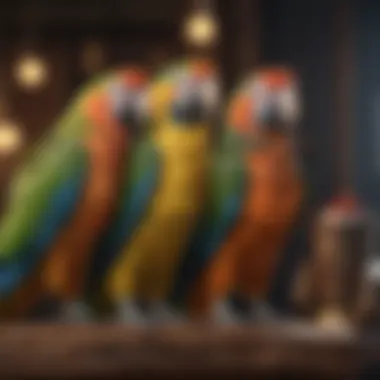
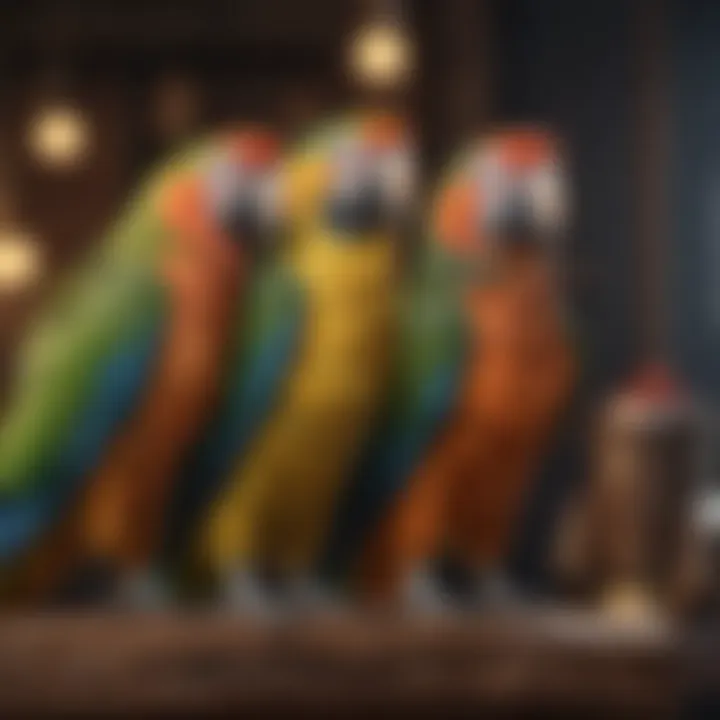
- Sudden Change in Behavior: If your parrot is less active or aggressive, it could be a sign of distress.
- Loss of Appetite: If your parrot refuses to eat for more than a day, it warrants concern.
- Physical Symptoms: Discharge from the eyes or nose, swelling, or unusual droppings should be evaluated.
- Weight Loss or Gain: Both drastic changes can indicate underlying health issues.
It is always safer to err on the side of caution. If unsure, consult a veterinarian knowledgeable about avian health.
By understanding how to recognize health issues, implementing preventative care, and knowing when to seek help, parrot owners can promote a healthier, happier life for their pets.
The Commitment of Parrot Ownership
Owning a parrot is not merely about having a colorful companion in your home. It is a significant commitment that spans several years, even decades, depending on the species. Understanding and acknowledging this commitment is crucial for any prospective owner. Parrots are intelligent creatures, requiring much more than minimal care. Their needs range from daily interaction to long-term health management, making informed decision-making essential.
Time and Interaction Requirements
Parrots are inherently social animals. They thrive on interaction, which means that dedicating adequate time to engage with your parrot is vital. Unlike some pets that may be content with less interaction, parrots require daily socialization. This may include talking, playing, and simply spending time in each other's presence. Failure to provide enough interaction can lead to behavioral issues such as feather plucking or excessive vocalization.
- Daily Interaction: It is recommended to engage with your parrot for at least a couple of hours each day.
- Playtime: Constructing a play area or offering toys can enrich their environment.
- Training Sessions: Incorporating training not only stimulates their minds but also strengthens the bond between owner and pet.
Long-Term Responsibility
Investing in a parrot means entering a long-term relationship that often lasts upwards of 20 years, depending on the species. The responsibility entails not only daily care but also financial considerations, such as vet check-ups, high-quality food, and appropriate housing. Additionally, owners should be prepared for unexpected circumstances that may arise.
- Budgeting for Care: Expect to allocate funds for food, toys, and medical expenses. A well-cared-for parrot can incur significant costs over its lifespan.
- Living Arrangements: Ensure your home is suitable for a parrot, considering both safety and stimulation. A dedicated space for their cage and playtime is important.
- Informed Care: Owners must be ready to research and learn about their specific parrot species, as well as their individual needs and preferences.
Understanding Lifespan and Commitment
The lifespan of a parrot varies greatly among species, with some smaller breeds like Budgerigars living up to ten years, while larger breeds such as Macaws can live for 50 years or more. This longevity highlights the seriousness of the commitment required. Potential owners must consider their ability to provide a stable home environment throughout the bird’s life.
- Adoption Considerations: Many parrots end up in rescues or shelters due to lack of commitment from previous owners. Understanding this can guide ethical decisions on adoption.
- Future Planning: Consider your life circumstances. Will you be able to care for your parrot if your living situation changes?
- Health Concerns Over Time: With age, parrots may encounter health-related issues. Owners must be prepared to manage or seek treatment for such conditions.
Owning a parrot is a long-term commitment that requires dedication and effort. It is not just about providing shelter, but also about nurturing a meaningful relationship that lasts a lifetime.
In summary, the commitment of parrot ownership involves a clear understanding of time, financial, and emotional resources needed to support these complex creatures. Their joy and companionship can be incredibly rewarding, but recognizing the depth of this commitment is essential for fostering a happy and healthy relationship.
Ethical Considerations
When bringing a parrot into your home, ethical considerations play a crucial role in responsible ownership. The decision to adopt a parrot is not just about securing a companion; it involves an understanding of the broader implications of supporting certain practices in the pet industry.
Sourcing Parrots Responsibly
Sourcing parrots responsibly is vital for numerous reasons. Wild bird populations are under increasing threat due to habitat loss and illegal trapping. By choosing to adopt from reputable sources, such as established rescue organizations or shelters, you mitigate the demand for birds from less scrupulous breeders. These breeders may not follow ethical practices, leading to problematic outcomes for both the birds and potential owners.
Here are some specific points to consider when sourcing parrots:
- Research Reputable Rescues: Look for rescues that offer transparency about their operations and the birds they care for. Organizations such as the American Society for the Prevention of Cruelty to Animals (ASPCA) can be useful in identifying reputable sources.
- Know the Background of the Bird: It's essential to understand the history and health of the bird. Many rescues can provide details about behavior and any specific needs.
- Avoid Wild-Caught Parrots: The capture of wild parrots can be detrimental to their populations. Always opt for domestically bred or rescued birds.
By being diligent about where you source your parrot, you contribute to the ethical treatment of animals and discourage harmful practices within the industry.
Understanding Breeding Practices
Breeding practices vary widely across the industry. Understanding these practices helps prospective parrot owners recognize what constitutes ethical breeding.
A few key aspects to consider include:
- Ethical Breeding Standards: Responsible breeders will focus on the health and well-being of their birds. This includes providing adequate space, socialization, and veterinary care during breeding.
- Genetic Considerations: Some breeders prioritize genetic health, minimizing the likelihood of inherited conditions. This is especially important in species prone to certain health issues.
- Social Development: Birds raised in isolation may face challenges in socialization later, affecting their adaptability in a home environment. Good breeders place emphasis on interaction with humans and other birds.
Overlooking these considerations may lead to health and behavioral challenges down the line. As a responsible owner, ensuring you understand these practices fosters a better pet-owner relationship and a healthier pet.
"Choosing the right source for your parrot not only reflects personal values but also supports the well-being of animal populations as a whole."
Overall, approaching parrot ownership with a strong ethical framework ensures not only the welfare of the individual bird but also contributes positively to the broader ecosystem of pet ownership.
Epilogue
The conclusion serves a pivotal role in summing up the themes and notions discussed throughout this guide. Parrot ownership is not merely about having a colorful companion; it involves a deep commitment to understanding the needs and behaviors of these intelligent animals. A thorough overview has been provided regarding the care essentials, training aspects, and the ethical considerations vital for responsible ownership.
Summarizing Parrot Ownership
Owning a parrot can be one of life’s rewarding experiences. They have personalities that can rival many other pets, and their ability to bond with humans is remarkable. As we explored, their care requires a stable environment, proper diet, and frequent interaction. Each species of parrot presents its own unique challenges and rewards, which prospective owners should be aware of.
Here are the primary points to remember:
- Environment: The living space must mimic their natural habitat, providing ample space for movement and play.
- Diet: A balanced diet is essential, mixing seeds, pellets, and fresh foods suitable for their health.
- Social Interaction: Parrots thrive on attention. They need mental stimulation and socialization, both of which are crucial for their wellbeing.
In short, understanding these principles of parrot ownership primes owners for the responsibilities and joys that come with it.
Final Thoughts on Companionship
The connection developed with a parrot can be profound. They are not just pets; they are companions that can offer empathy and entertainment. Engaging with a parrot requires patience, but the bond that forms often leads to a fulfilling companionship.
As pet owners, it is important to appreciate the reciprocal relationship. Parrots convey affection and recognition, creating an atmosphere of mutual respect. However, owning a parrot also means committing to their welfare, ensuring that their needs are met. This includes providing a loving home, regular veterinary check-ups, and interaction that fuels their intellectual curiosity.







